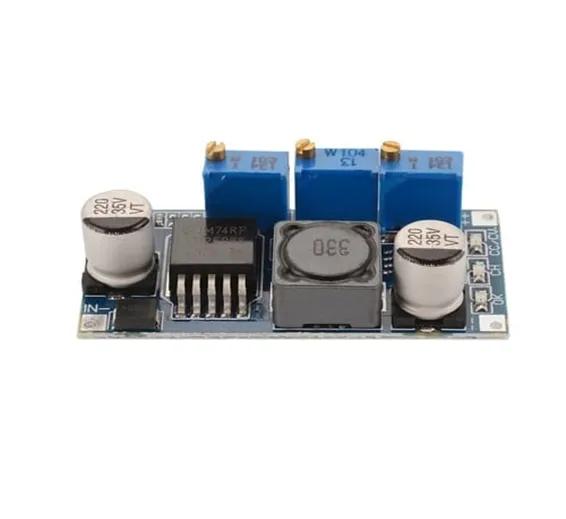This
LM2596
Constant
Voltage
/
Constant
Current
(CC/CV)
regulator
module
is
a
very
flexible
and
adaptable
charging
solution
that
can
provide
either
a
Constant
Voltage
(CV)
or
Constant
Current
(CC)
output.
With
a
variable
output
voltage
range
of
1.25V
to
30V
and
variable
output
current
from
0A
to
3A,
it
is
ideal
for
use
as
an
LED
or
laser
diode
current
source/driver,
a
battery
charger,
a
lab
current/voltage
source,
or
to
regulate
the
output
of
solar
panels
or
wind
turbines
to
charge
energy
storage
batteries.
It
can
charge
most
any
size
lithium
ion
cell
to
almost
any
voltage
you
need.
This
is
an
inexpensive
way
to
charge
those
4.30v
and
4.35v
cells,
as
well
as
LiFePo
and
many
other
cells
that
require
different
termination
voltages.
It
is
also
a
good
way
to
charge
smaller
cells
since
you
can
almost
infinitely
adjust
the
charging
current
and
output
voltage.
Applications:
High-power
(up
to
3A)
LED
or
laser
diode
constant
current
driver
Lithium
battery
charger
4V,
6V,
12V,
14V
or
24V
nickel
cadmium
or
nickel
metal
hydride
battery
charger
High
conversion
efficiency
when
used
with
car
12V
battery
input
Adjustable
laboratory
voltage
source
or
current
source
Dimming
devices
Regulate
output
of
solar
panels
and
wind
turbines
Features:
Non-isolated
step-down
constant
current,
constant
voltage
module
(CC
CV
charging
module)
Input
voltage:
7V
to
35V.
For
best
efficiency,
output
voltage
should
be
about
80%
of
input
voltage
Output
voltage:
Continuously
adjustable
from
1.25V
to
30V
Minimum
Voltage
difference
(input
V
-
output
V):
~2V
Maximum
output
current:
3A
(more
than
15W
output,
please
install
a
heat
sink)
Constant
current
range:
0A
to
3A
(adjustable)
Output
power:
15W
with
natural
cooling,
25W
with
heatsink
Conversion
efficiency:
Up
to
92%
(Higher
efficiency
at
higher
output
voltage)
Full
load
temperature
rise:
45
°C
No-load
Current:
Typical
10mA
(12V
switch
to
4.2V)
Load
regulation:
±
1%
Voltage
regulation:
±
0.5%
Dynamic
response
speed:
5%
200uS
Potentiometer
adjustment
direction:
clockwise
(increase),
counterclockwise
(decrease)
Indicators:
CC/CV
Red
LED:
Charging
in
constant
current
mode
CH
Blue
LED:
Fully
charged
OK
Red
LED:
Charging
in
Constant
Voltage
Mode
Output
short
circuit
protection:
Yes,
constant
current
(constant
current
value
of
the
current
settings)
Input
reverse
polarity
protection:
No,
please
comply
with
input
voltage
specifications
or
place
an
input
reverse
polarity
protection
diode
in
series.
Connection
mode:
Soldered
Operating
temperature:
Industrial
grade
(-40C
to
+85C)
(if
ambient
temperature
exceeds
40C,
reduce
power
or
add
a
heatsink)
Size:
47mm
(L)
*
23mm
(W)
*
14mm
(H)
mm
(including
potentiometers)
To
use
the
LM2596
CC/CV
Regulator
Module
as
an
LED
Constant
Current
Driver:
Make
sure
of
the
operating
current
and
maximum
operating
voltage
of
the
LED
you
will
drive.
With
no
load
connected
to
the
output
of
the
module
(open
circuit),
adjust
the
Constant
Voltage
potentiometer
CV
to
set
the
output
voltage
to
the
LED
maximum
operating
voltage.
Short-circuit
the
module
output,
and
use
a
multimeter
in
10A
current
scale
to
measure
output
short-circuit
current,
and
adjust
the
Current
Potentiometer
CC
to
set
the
output
current
to
the
required
LED
operating
current.
Connect
the
LED
to
the
module
and
test.
The
module
can
drive
multiple
LEDs
in
series,
parallel
or
in
series/parallel
strings,
as
long
as
the
maximum
voltage
and
current
of
the
string
does
not
exceed
the
30V
maximum
output
voltage
and
3A
maximum
output
current
of
the
driver
module.
To
use
the
LM2596
CC/CV
Regulator
Module
as
a
Battery
Charger:
Make
sure
of
the
charging
voltage
and
current
of
the
battery
you
need
to
charge.
With
no
load
connected
to
the
output
of
the
module
(open
circuit),
adjust
the
Constant
Voltage
potentiometer
CV/OK
to
set
the
output
voltage
to
the
battery
charge
voltage
Short-circuit
the
module
output,
and
use
a
multimeter
in
10A
current
scale
to
measure
output
short-circuit
current,
and
adjust
the
Current
Potentiometer
CC
to
set
the
output
current
to
the
expected
charging
current
value.
Charge
transfer
lamp
(CH)
current
default
value
is
0.1
times
the
charging
current
(constant
current
value),
For
lamp
current
adjustment,
turn
middle
Charging
Convert
Light
potentiometer
adjustment;
Connect
the
module
outputs
to
the
battery
and
try
charging.
Based on 1 reviews
5
overall
shahwaiz Aslam
- March 26, 2021







